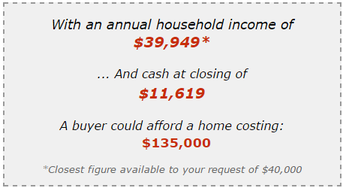|
Zeno Mountain Farm and Veteran Farmer Coalition of Vermont are sponsoring a reintegration retreat weekend March 31- April 3; see the flier below for details.
0 Comments
 Fred Baser of Bristol is sponsoring a bill this session to fund planning grants for and provide regulatory benefits to two "workforce housing" pilot projects. The bill is targeted at rental and/or ownership housing for families earning approximately 100% to 150% of Area Median Income, or $73,300 for a family of four in Addison County. A hypothetical median family of four earning $73,300 annually could afford a home purchase price of $255,000 with $19,000 in cash at closing, or monthly rent of $1,833 including utilities. The median family does not necessarily have four members (according to the ACS, the median family has 2.39 members), and in fact median household income as calculated by the American Community Survey is closer to $59,000 in Addison County. This household could afford a home purchase of just over $200,000, and a monthly rent of about $1,500. That's about 115% of Fair Market Rent. Housing affordability is an important issue and it's an indicator that things have reached fever pitch when families at 100-150% of AMI are feeling the pinch. Consider a working family with two full-time minimum wage earners, whose annual income would be approximately $40,000. That family could afford to pay roughly $1,000/mo in rent for their "workforce housing," or just below median rent for a 2br apartment in Addison County. Home price calculation from www.housingdata.org
Last month, the Urban Institute highlighted an innovative program in Detroit to address the "appraisal gap"--basically, a barrier to rehabbing the city's derelict housing stock caused by the cost of rehab exceeding the new appraised value of the home.
Vermont has one of the oldest housing stocks in the country and bears some parallels to the situation in Detroit, in that much of the affordable properties on the market are also in need of excessive updating, especially in the realm of energy efficiency. Additionally, one of the underlying factors responsible for the appraisal gap is the lack of comparable sales--similarly, VT has a lower sales volume that can make it difficult to appraise properties with a high degree of confidence. Detroit's program creates a pool of lenders willing to offer high LTV first mortgages without charging fees, and a second lien fund to subsidize soft second mortgages to finance the rehab even when the total amount borrowed may exceed appraised value. To my knowledge, nothing like this exists in Vermont...how 'bout it, VHFA? Evictions are an incredibly tough but unfortunately sometimes necessary part of the job at ACCT. Despite efforts to support residents and connect them with services, sometimes things just don't work out. Financial strains to the property and stress on the social fabric of the community are important considerations that must be weighed against an individual household's right to a safe, decent, affordable place to call home.
In a new book out this month, Harvard sociologist Matthew Desmond tells another side of the eviction story. In "Evicted: Poverty and Profit in the American City," Desmond introduces us not only to families whose lives have been decimated by eviction, but also to the landlords that profit off of their situation. In his telling, eviction is not just a consequence of poverty, but a cause of it as well, and poverty is not just an absolute or even relative condition of the poor, but an inextricable relationship between rich and poor where the deprivation of one contributes to the enrichment of the other. Ultimately, Desmond advocates for increasing housing vouchers to support low-income Americans' ability to afford decent housing and avoid eviction. From my perspective at ACCT, this is only a piece of the puzzle. Supporting institutions like ACCT can help us increase housing supply at affordable price points. It can also increase our capacity to serve hard-to-serve tenants and to be more flexible in addressing their needs. When affordable housing organizations are underfunded, we have very little leeway to absorb losses and spend time finding alternate solutions for tenants who can’t pay the rent, or making sure we set aside enough money for maintenance and capital needs. "Evicted" has sparked a conversation on the role of affordable housing in poverty alleviation; we look forward to being a part of the solution in Addison County.  The March issue of the Washington Electric Co-op newsletter features a story on the history of the VerMod high performance mobile home, (a model that ACCT is using to redevelop the blighted Gevry mobile home park in Waltham) focusing on how the innovative design can help mobile home owners--who constitute 7 percent of the state's housing stock--reduce their energy usage. For example, did you know that a VerMod has twice the insulation of a new mobile home? Check out the article in full below. |
AuthorAddison Housing Works staff members share news and information about upcoming events. Archives
July 2024
Categories |
||||||
Main Office: 272 Main St | PO Box 311 | Vergennes, VT 05491 | (802)877-2626 | TTY: 7-1-1
Apartment Management Division: 272 Main St | PO Box 156 | Vergennes, VT 05491 | (802)877-2626
Apartment Management Division: 272 Main St | PO Box 156 | Vergennes, VT 05491 | (802)877-2626

 RSS Feed
RSS Feed